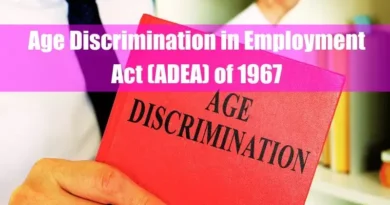Title VII of the Civil Rights Act of 1964
Takeaways
| Key Points |
|---|
| Title VII of the Civil Rights Act of 1964 prohibits employment discrimination based on race, color, religion, sex (including pregnancy, gender identity, and sexual orientation), and national origin, ensuring equal opportunities for all. |
| Race discrimination encompasses biased practices in hiring, promotions, and workplace policies, while color discrimination specifically addresses differential treatment based on skin tone, even within the same racial group. |
| Religious protections require employers to accommodate sincerely held beliefs unless doing so imposes undue hardship, including allowing for prayer breaks and flexible scheduling for observances. |
| Sex-based protections cover pregnancy, gender identity, and sexual orientation, requiring employers to treat pregnant employees equitably and base decisions on qualifications rather than gender. |
| Additionally, Title VII safeguards against national origin discrimination, prohibits biased hiring practices, unlawful termination, and disparities in promotion or compensation, and requires employers to prevent harassment, retaliation, and hostile work environments, with enforcement overseen by the EEOC through investigations, mediation, and compliance assistance. |
Introduction to Title VII
Overview of the Civil Rights Act of 1964
The Civil Rights Act of 1964 is a landmark piece of legislation in the United States, fundamentally reshaping the nation’s legal landscape regarding civil rights. Enacted on July 2, 1964, this act sought to eliminate segregation in public places. It prohibited employment discrimination based on race, color, religion, sex, or national origin. Title VII, in particular, focuses on employment discrimination, setting the framework for equal employment opportunities in the workplace.
Title VII prohibits employers from discriminating against employees or applicants based on race, color, religion, sex (including pregnancy, gender identity, and sexual orientation), or national origin.
This law covers employers with 15 or more workers, including federal, state, and local governments.
Specific Focus on Title VII
Title VII is the cornerstone of federal employment discrimination law in the United States. Its primary goal is to ensure that all individuals have equal access to employment opportunities regardless of their inherent characteristics. It mandates that employers cannot make employment decisions based on discriminatory factors.
This includes hiring, firing, promotions, compensation, and other terms and conditions of employment.
The law also covers harassment and retaliation, making it illegal for an employer to harass an employee based on protected characteristics or retaliate against an employee for filing a discrimination complaint or participating in an investigation or lawsuit under Title VII.
Key Amendments and Evolution
Title VII has been updated over time to broaden its protections. Notably, the Pregnancy Discrimination Act of 1978 amended Title VII to prohibit discrimination based on pregnancy, childbirth, or related medical conditions.
More recently, in the landmark 2020 Supreme Court decision in Bostock v. Clayton County, the Court held that Title VII’s prohibition of sex discrimination also covers discrimination based on sexual orientation and gender identity. This decision marked a significant expansion of the scope of Title VII, affirming its role as a critical tool for protecting the rights of LGBTQ+ individuals in the workplace.

Protected Characteristics under Title VII
Race
Title VII explicitly prohibits discrimination based on race, ensuring that individuals of all racial backgrounds have equal employment opportunities. Discrimination can manifest in various ways, including hiring practices, workplace policies, and promotions. Employers are required to treat all employees equally, regardless of their race.
Color
Discrimination based on color, though often conflated with race, is separately addressed under Title VII. It refers to discrimination based on the shade or tone of a person’s skin. This protection ensures that individuals are not subjected to differential treatment based on their skin color, even within the same racial or ethnic group.
Religion
Title VII also protects individuals from discrimination based on religion. Employers must accommodate an employee’s sincerely held religious beliefs or practices unless doing so would cause undue hardship on the business’s operation. This includes allowing flexible scheduling for religious observances, permitting religious dress or grooming practices, and providing prayer breaks.

Sex (including Pregnancy, Gender Identity, and Sexual Orientation)
Sex discrimination under Title VII includes discrimination based on gender, pregnancy, gender identity, and sexual orientation. This protection has evolved over time, most notably by including gender identity and sexual orientation as protected characteristics under the law.
Employers are prohibited from making employment decisions based on an employee’s sex. They must treat pregnant employees like other employees who are similar in their ability or inability to work.

National Origin
Discrimination based on national origin includes treating individuals unfavorably because they are from a particular country or part of the world, because of their ethnicity or accent, or because they appear to be of a certain ethnic background (even if they are not).
Title VII ensures that individuals are not discriminated against based on their heritage, ensuring all workers have equal employment opportunities regardless of national origin.
Prohibited Employment Practices
Discriminatory Hiring Practices
Under Title VII, employers cannot refuse to hire someone based on any of the protected characteristics. This means all job applicants must be considered equally regardless of race, color, religion, sex, or national origin. Job postings, interviews, and selection processes must be free from bias and discrimination.
Unlawful Termination
Termination decisions cannot be based on an employee’s race, color, religion, sex, or national origin. Unlawful termination occurs when an employer dismisses an employee for discriminatory reasons. Title VII protects employees from being wrongfully terminated based on their membership in a protected class.
Discrimination in Promotion, Compensation, and Other Employment Terms
Title VII prohibits discrimination in promotions, compensation, and other employment terms and conditions. Employers cannot decide about promotions, raises, job assignments, or other employment benefits based on discriminatory factors.
Employees should be evaluated based on their qualifications and performance, not on characteristics protected under Title VII.
Harassment and Hostile Work Environment
Harassment is a form of discrimination that violates Title VII. It includes unwelcome conduct based on race, color, religion, sex, or national origin that is severe or pervasive enough to create a hostile work environment. Employers are responsible for preventing and addressing harassment in the workplace, ensuring that employees can work in an environment free from discrimination and hostility.
Retaliation for Exercising Rights under Title VII
Title VII safeguards employees from retaliation if they report discrimination, take part in an investigation, or oppose discriminatory practices. Retaliation can include adverse actions like demotion, termination, or any other form of punishment for engaging in protected activity.
This protection is critical to ensuring employees feel safe asserting their rights without fear of retribution.

Title VII and the Role of the Equal Employment Opportunity Commission (EEOC)
EEOC’s Enforcement Authority
The EEOC is the federal agency responsible for enforcing Title VII. It can investigate discrimination complaints, mediate disputes, and bring lawsuits against employers who violate the law. The EEOC provides guidance and education to employers and employees on their rights and responsibilities under Title VII.
Filing a Charge of Discrimination
To file a charge of discrimination, an individual must contact the EEOC. The complaint must be filed within 180 days of the alleged discriminatory action, although this deadline might be extended under certain conditions. The EEOC will investigate the charge, and if it finds merit, it may seek to resolve the issue through mediation or bring a lawsuit on behalf of the complainant.
Investigation and Resolution Process
Once a charge is filed, the EEOC investigates whether there is reasonable cause to believe discrimination occurred. If the investigation finds that discrimination likely occurred, the EEOC will attempt to settle the matter. If a settlement is not reached, the EEOC may file a lawsuit or issue a “right to sue” letter, allowing the complainant to pursue legal action independently.
EEOC Guidance and Compliance Assistance
The EEOC provides guidance to help employers comply with Title VII. This includes resources on best practices for preventing discrimination and promoting diversity in the workplace. The EEOC also offers training programs and technical assistance to help employers understand their obligations under the law.

Significant Court Cases and Legal Precedents
Landmark Supreme Court Decisions
Over the years, several Supreme Court cases have shaped the interpretation and application of Title VII. One of the most significant cases is Griggs v. Duke Power Co. (1971), where the Court ruled that employment practices must be related to job performance and that practices that disproportionately affect a protected group can be considered discriminatory, even if there was no intent to discriminate.
Another pivotal case is Meritor Savings Bank v. Vinson (1986), which established that sexual harassment creating a hostile work environment violates Title VII. This decision set the precedent that harassment is not limited to economic or tangible discrimination but also includes conduct that creates an abusive work environment.
The Bostock v. Clayton County (2020) decision was a groundbreaking ruling where the Supreme Court held that discrimination based on sexual orientation or gender identity is a form of sex discrimination under Title VII. This expanded the scope of Title VII to include protections for LGBTQ+ employees, affirming that Title VII’s prohibition of sex discrimination encompasses sexual orientation and gender identity.
Impact of Recent Rulings on Title VII Interpretation
Recent rulings have continued to refine and expand the interpretation of Title VII. The Bostock decision, in particular, has had a profound impact, leading to increased protections for LGBTQ+ individuals in the workplace. It clarified that discrimination against employees because of their sexual orientation or gender identity is a violation of Title VII, thus ensuring broader protections for all employees under the law.
Other recent cases have addressed religious accommodations and the scope of retaliation protections. These decisions underscore the evolving nature of Title VII and its application in modern workplaces, ensuring that the law remains relevant in addressing contemporary discrimination issues.
Case Studies Demonstrating Title VII Enforcement
Title VII enforcement is evident in numerous cases where the EEOC has taken action against employers for violations. For example, in EEOC v. Abercrombie & Fitch Stores, Inc. (2015), the Supreme Court ruled that an employer could be liable under Title VII for refusing to hire an applicant based on a religious practice, even if the employer did not have direct knowledge of the need for an accommodation.
Employee Rights under Title VII
Understanding Your Rights
Employees have the right to work in an environment free from discrimination based on race, color, religion, sex, or national origin. They are protected from discriminatory practices in all aspects of employment, including hiring, firing, promotions, and compensation.
Employees also have the right to file a complaint if they believe they have been subjected to discrimination or retaliation.
How to File a Complaint
Employees who believe they have been discriminated against can file a charge with the EEOC. The complaint must be filed within 180 days of the discriminatory act, though this period may be extended under certain circumstances.
The EEOC will then investigate the claim and attempt to resolve the issue through mediation or legal action if necessary.
Protection from Retaliation
Title VII provides robust protection against retaliation. This means employers cannot take adverse actions against employees who file discrimination complaints, participate in investigations, or oppose discriminatory practices.
Retaliation can include actions such as demotion, termination, or harassment and violates Title VII.
Available Remedies for Victims of Discrimination
Victims of discrimination under Title VII are entitled to various remedies, depending on the circumstances of the case. These can include reinstatement to their job, back pay, compensatory and punitive damages, and legal fees.
Sometimes, the court may also order the employer to take corrective actions, such as implementing new policies or conducting employee training.
Recent Developments and Future Directions
Recent Amendments and Legislative Changes
Recent legislative changes have continued to shape the application of Title VII. For instance, updates to EEOC guidelines have clarified issues related to sexual harassment and gender identity discrimination, ensuring that the protections under Title VII are applied consistently across different cases.
Emerging Issues in Title VII Interpretation (e.g., LGBTQ+ Rights)
One of the most significant recent developments is the inclusion of sexual orientation and gender identity under the scope of Title VII. As society continues to evolve, new challenges and interpretations of Title VII are likely to emerge, particularly concerning issues such as religious freedoms versus anti-discrimination protections and the rights of transgender individuals in the workplace.
Potential Future Revisions and Expansions of Title VII
As employment practices and societal norms evolve, Title VII may undergo further revisions to address new forms of discrimination and emerging workplace challenges. Potential areas for expansion could include broader protections for gig economy workers, clarification on the intersection of Title VII with other anti-discrimination laws, and enhanced enforcement mechanisms to ensure compliance.
Compliance and Penalties for Violations
Penalties for Non-Compliance
Employers who violate Title VII face significant penalties. These include compensatory and punitive damages, legal fees, and court-ordered corrective actions. In cases of egregious violations, the EEOC may also sanction employers, including increased monitoring and reporting requirements.
Legal and Financial Consequences for Employers
Beyond direct penalties, employers who violate Title VII may suffer reputational damage, loss of business, and decreased employee morale. Legal battles can be costly and time-consuming, often leading to settlements or judgments that can impact a company’s financial stability.
Best Practices to Ensure Compliance with Title VII
To avoid violations and ensure compliance with Title VII, employers should implement comprehensive anti-discrimination policies, conduct regular training, and establish clear procedures for addressing complaints. Employers should also stay informed about changes in the law and emerging trends in employment discrimination so that they can adapt their practices accordingly.
Conclusion
Title VII of the Civil Rights Act of 1964 remains a vital tool in the fight against employment discrimination in the United States.
By understanding the law’s provisions, employers and employees can contribute to a fairer, more inclusive workplace.
Continued vigilance and commitment to equality are essential to ensuring that the protections afforded by Title VII are fully realized in every workplace.
FAQ
What is Title VII of the Civil Rights Act of 1964?
Title VII prohibits employment discrimination based on race, color, religion, sex (including pregnancy, sexual orientation, and gender identity), or national origin. It applies to employers with 15 or more employees, including federal, state, and local governments.
Who enforces Title VII?
The Equal Employment Opportunity Commission (EEOC) enforces Title VII. The EEOC investigates discrimination complaints, mediates disputes, and may file lawsuits on behalf of employees. Individuals can also file private lawsuits after obtaining a “Notice of Right to Sue” from the EEOC.
What types of employment practices are prohibited under Title VII?
Title VII prohibits discrimination in various employment practices, including hiring, firing, promotions, compensation, and other terms, conditions, or privileges of employment. It also forbids retaliation against individuals for opposing discriminatory practices or participating in discrimination investigations or lawsuits.
Does Title VII protect against sexual harassment?
Yes, Title VII prohibits sexual harassment, which is considered a form of sex discrimination. This includes unwelcome sexual advances, requests for sexual favors, and other verbal or physical harassment of a sexual nature that affects employment conditions or creates a hostile work environment.
Should employers accommodate employees’ religious practices under Title VII?
Employers must reasonably accommodate employees’ sincerely held religious beliefs or practices unless doing so would cause undue hardship on the business. This can include flexible scheduling, voluntary shift substitutions, and workplace policies or practice modifications.
What is the process for filing a discrimination complaint under Title VII?
Individuals must file a charge of discrimination with the EEOC within 180 days of the alleged discriminatory act. This period may be extended to 300 days if a state or local agency enforces a law prohibiting the same type of discrimination. After filing, the EEOC investigates the complaint and may mediate or pursue legal action.
Can an employer be held liable for discrimination by its employees under Title VII?
Yes, employers can be held liable for discriminatory actions by their employees, especially if the employer knew or should have known about the discrimination and failed to take prompt and appropriate corrective action. This includes harassment by supervisors, coworkers, or even non-employees in the workplace.
Does Title VII apply to U.S. citizens employed abroad?
Title VII generally does not apply to U.S. citizens employed by American employers outside the United States. However, there are exceptions, such as when a U.S. entity controls the employer or when U.S. law is explicitly intended to apply extraterritorially.
Are there any exceptions to Title VII’s coverage?
Title VII does not apply to employers with fewer than 15 employees, certain religious organizations when hiring individuals of a particular religion, Native American tribes, and bona fide private membership clubs exempt from taxation. Additionally, the bona fide occupational qualification (BFOQ) exception allows employers to hire based on religion, sex, or national origin when it is reasonably necessary to the normal operation of the business.
How does Title VII define “undue hardship” for religious accommodations?
Under Title VII, an undue hardship is an accommodation requiring more than minimal cost or burden on the employer’s operations. Factors considered include the nature and cost of the accommodation, the overall financial resources of the facility, and the impact on the operation of the facility.
Can an employer require English-only rules in the workplace under Title VII?
Employers can implement English-only rules if they are justified by business necessity, such as for safety or efficient operation. However, blanket English-only policies may violate Title VII if they create a disparate impact on employees based on national origin. Employers should ensure such rules are limited in scope and clearly communicated to employees.
Does Title VII protect against discrimination based on sexual orientation or gender identity?
Yes, Title VII’s prohibition of sex discrimination includes discrimination based on sexual orientation and gender identity. This interpretation has been upheld by the U.S. Supreme Court, ensuring that LGBTQ+ individuals are protected under federal employment discrimination laws.
Are independent contractors protected under Title VII?
Title VII protections generally apply to employees, not independent contractors. However, the determination of whether an individual is an employee or an independent contractor depends on various factors, including the degree of control the employer has over the work performed. It’s important to assess the working relationship to determine coverage under Title VII.
Can an employer retaliate against an employee for filing a discrimination complaint under Title VII?
No, Title VII prohibits employers from retaliating against employees for engaging in protected activities, such as filing a discrimination complaint, participating in an investigation, or opposing discriminatory practices. Retaliation can include adverse actions like termination, demotion, or harassment. Employees who experience retaliation can file a separate charge with the EEOC.
How does Title VII address pregnancy discrimination?
Title VII, as amended by the Pregnancy Discrimination Act, prohibits discrimination based on pregnancy, childbirth, or related medical conditions. Employers must treat pregnancy-related conditions the same as any other temporary disability concerning employment decisions, benefits, and leave policies.
What remedies are available under Title VII for victims of discrimination?
Victims of discrimination under Title VII may be entitled to remedies such as reinstatement, back pay, compensatory damages for emotional distress, punitive damages, and coverage of attorney’s fees and court costs. The specific remedies depend on the case’s circumstances and are subject to statutory limits.
How does Title VII interact with state anti-discrimination laws?
Title VII sets minimum federal standards for employment discrimination protections. State laws may offer additional protections or cover employers with fewer than 15 employees. When both apply, employers must adhere to the law that provides greater employee protection.
Are job advertisements with discriminatory language prohibited under Title VII?
Yes, Title VII prohibits job advertisements that express a preference or limitation based on race, color, religion, sex, or national origin, unless a bona fide occupational qualification applies. Such language can discourage protected groups from applying and is considered discriminatory.
Can employers implement affirmative action plans under Title VII?
Employers may implement affirmative action plans to promote equal employment opportunities and address past discrimination. However, these plans must be narrowly tailored, temporary, and not impose unnecessary restrictions on non-beneficiaries’ rights. Recent legal developments may impact the implementation of such plans.
How does Title VII define “religion” regarding protection against discrimination?
Title VII broadly defines ” religion, ” encompassing all aspects of religious observance, practice, and belief. This includes not only traditional, organized religions but also sincerely held ethical or moral beliefs. Employers must accommodate these beliefs unless they cause undue hardship.
Citation
Title VII of the Civil Rights Act of 1964. (n.d.). US EEOC. https://www.eeoc.gov/statutes/title-vii-civil-rights-act-1964









